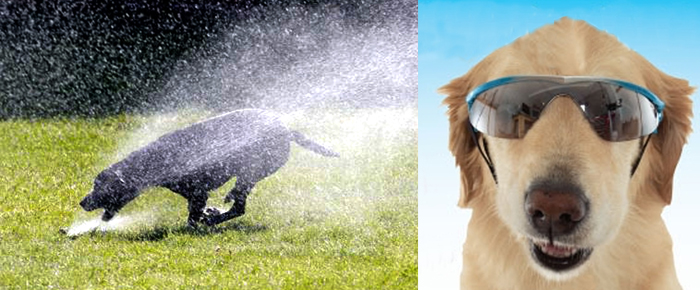
By Janet McAfee
The intense grueling summer sun continues to heat up the Coachella Valley during September. We need to take precautions that our four-legged friends are kept healthy and safe during this hot weather. Previous columns discussed the dangers of leaving your pets outside 24 hours a day, and in cars while you run that “quick” errand. Just this week I spotted a driver get out of her car leaving a Husky dog inside while she went into the city shelter to get a dog license. We chased after her to issue a warning. She was cooperative and took the dog inside with her, but was completely surprised by the information her dog could perish this way.
Did you know that your pet’s fur may not be enough to protect them from sun damage? Veterinarian Jimmy Desmond explains, “Dogs and cats are susceptible to skin damage from the sun’s UV rays just like people. Pets can get sunburned resulting in ulcerated skin, permanent skin damage and even cancer.” Those most at risk are pets with white colored short fur, and those with lighter colored noses. Areas of their bodies most at risk are the nose, ears, anyplace where the hair is thin, the belly and around the mouth.
Sunscreen especially designed for pets can be applied. However, sunscreen meant for humans may contain ingredients that are toxic to animals. You can use the spray on sunscreen intended for children, but take care to avoid pet’s eyes. Be sure to schedule an appointment with your vet if you notice any suspicious growths or lesions on your pet’s skin.
Heat stroke presents a serious danger to animals in our sunny climate. Dogs and cats don’t perspire, and can only dispel heat by panting and through the pads of their feet. Brachycephalic breeds with short noses such as Pugs, Bulldogs, and Pekingese and large dog with heavy coats are at greater risk of heat stroke. Older animals and those with existing heart or respiratory conditions are more vulnerable to this condition.
What are the most common causes of heat stroke in dogs? Strenuous exercise in hot weather should be avoided. Leaving an animal unattended in a parked car can be deadly. The inside of a car parked in the sunshine can turn deadly when the outdoor temperature is only 70 or 80 degrees. Confining an animal on concrete or asphalt surfaces is dangerous. Keeping an animal outdoors in the hot weather without shade and fresh water is cruel and a recipe for disaster. Muzzling an animal while using a hair dryer can cause heat stroke during grooming.
Symptoms of heat stroke include excessive panting, staggering, stupor, seizures, excessive drooling, weakness and collapse, increased pulse and heart rate, and dark or bright red gums. Bloody diarrhea or vomiting may also be present.
Dr. Lillian Roberts of Country Club Animal Clinic in Palm Desert treats cases of heat stroke during our long summer season. Dr. Roberts advises, “Heat stroke cases should ALWAYS be seen immediately by a vet, but if possible the animal should be cooled down first using very cool but not ice cold water. Of course if the dog is unconscious, it should not be submerged. Muscular dogs with short muzzles are at highest risk for heat stress. Excitement and water restriction are major risk factors – it’s not just about the temperature. Foot pads can burn just by walking across the street, this cannot be overstated.”
Prevention is the key. Take your dog for long walks in the early morning and after the sun goes down. The greatest danger from sun exposure occurs between 10:00 am and 4:00 pm. When your pup needs to go outside for potty breaks, seek out areas that are shaded. If you walk them on asphalt or concrete, check the surface with your hand first. Doggles sun glasses can protect your dog’s eyes from the intense sunlight. Another tip from Dr. Roberts, “It’s ok to use lip protection on the nose. It’s harder to lick off, and it comes with a nontoxic sun screen as well.”
Country Club Animal Clinic is located at 36869 Cook Street, Suite 103, in Palm Desert. You can contact them at (760) 776-7555. Their website www.countryclubdvm.com contains additional information to keep your pet health and happy.
Jmcafee7@verizon.net










































